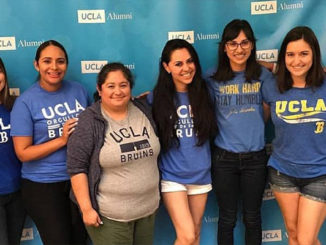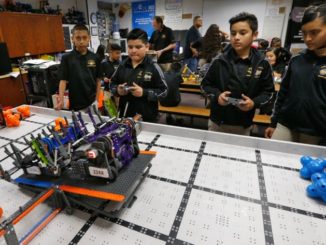
The lack of acceptance that racial and ethnic minorities and women face in STEM careers poses a significant problem in our quest for social justice.
by Brent Orrell and Daniel A. Cox
Troubling research has emerged in recent years about the career longevity of students graduating with degrees in science, technology, engineering and math (STEM).
According to Harvard University’s David Deming and Kadeem Noray, individuals with these credentials often start out with higher earnings but see that premium fade within 10 years of graduation. Deming and Noray also found that almost 20 percent of STEM-trained individuals ended up leaving their field in that same period.
Intrigued by these findings, we decided to dig deeper to see if we could gain a more complete understanding of the trends. Last summer, the American Enterprise Institute surveyed more than 1,300 individuals with STEM degrees to test a wide-range of questions about education, working conditions, pay and job satisfaction.
Some of the data confirms what we’ve long believed: most people who get STEM degrees and enter careers are enthusiastic about their jobs. Other findings were more troubling, raising concerns about how specific subgroups of STEM workers fare in their jobs and why a significant number of these individuals are leaving the field for good.
First, the good news. STEM degrees have become popular in recent years as the demand for technical skills for current and future jobs increases, drawing students with the promise of both prestige and earnings premiums. STEM workers are, for the most part, satisfied with their career opportunities. Few (17 percent) regret their choice of major, and nearly half feel they are more equipped to contribute to society than workers in other sectors.
In addition, healthy numbers of STEM workers have no fear of the traditional job-killing bogeymen: automation. This isn’t just a question of personal happiness — many feel a deep kinship with the field. Ninety-five percent of current and 85 percent of former STEM workers would recommend a similar career to a young person, which in some ways is the strongest endorsement of all.
However, experience in STEM fields varies considerably by gender, race and education. Women, minorities and those with associate degrees have found the field less than welcoming.
STEM has traditionally been dominated by younger white men — per our recent survey, 59 percent of the field is younger than 50, 70 percent are white and 65 percent are male.
Women were much more likely to say they faced career obstacles due to their gender. What this data suggests is that the uneven playing field for women in the STEM workforce may play a part in discouraging long-term commitment to the field. Longevity equates to seniority and advancement into management and leadership positions.
Lack of acceptance hurts Blacks, Latinos
STEM careers also are seen to be less welcoming for racial minorities, including African-Americans and Latinos. Fifty-one percent of those from nonwhite, non AAPI/Hawaiian backgrounds say African Americans face more obstacles and 46 percent say the same about Latinos.
But only 26 percent of white respondents believed African Americans face obstacles in STEM occupations, and 25 percent of white respondents said the same about Latinos. Disadvantage, in STEM fields as in the rest of life, is often in the eye of the beholder.
The lack of acceptance and obstacles to equal opportunity that racial and ethnic minorities and women perceive and experience in STEM careers pose a significant problem in our national quest for social and racial justice — and for our economic strength.
STEM jobs are rightly seen as a bridge to upward mobility and long-term financial security. But if women and minorities are excluded, or perceive themselves as being less welcome in STEM fields, we all suffer as a nation.
Associate degree may not be enough
The data on the performance of workers with associate degrees in STEM fields is also alarming. For the past several years, policymakers on both sides of the aisle have encouraged students to consider community college as an alternative pathway to four-year degrees.
The reality for sub-baccalaureate degrees in STEM is starkly different. Those with associate’s degrees were significantly more likely than those with bachelor or higher education to leave STEM fields (35 percent to 24 percent). To a significant degree this may be a function of “skill decay” as the narrower educational credential has more difficulty adapting to technological change. While sub-baccalaureate credentials are often a good investment, STEM-related associates-level credentials appear to be less satisfactory in generating opportunity.
Finally, pressure is something of a problem in STEM careers — workers report high expectations and nearly 75 percent of workers report they often or sometimes feel pressure to learn new skills in STEM fields. Though more young workers feel this compared to older ones, it is still a problem for them as well — about 70 percent of workers 50 to 64 feel this pressure. Employers appear to have recognized this. Nearly 80 percent of workers said their employers provided tools for learning new skills for both new (84 percent) and mature (76 percent) workers.
STEM skills and careers will remain important to America’s ability to compete internationally in the global economy. Advanced technology will also continue to have an outsized impact on economic and social opportunity, critical issues for women and minorities seeking their share of the American dream.
This survey shows that making STEM education and careers as welcoming and accessible as possible for these populations should be a top priority for industry and policymakers.
Brent Orrell is a resident fellow at the American Enterprise Institute, where he works on job training, workforce development, and criminal justice reform. Specifically, his research focuses on expanding opportunity for all Americans through improved work readiness and job training and improving the performance of the criminal justice system through rehabilitation and prisoner reentry programs.
Daniel Cox is a research fellow in polling and public opinion at the American Enterprise Institute (AEI), where he specializes in survey research, politics, youth culture and identity, and religion. @dcoxpolls



